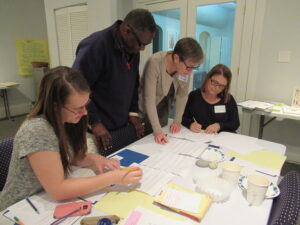If You Speak English, Can You Teach It?
Written by Paula Dincer, Program Communications & Data Management at First Literacy

Paula (middle right) with teachers at a First Literacy workshop.
Can you teach a language if your only qualification is that you speak the language? Not always, but often — in other words, it depends. It depends on what motivates you in the first place, and where you find training, mentorship, and community.
In my case, teaching ESOL had been a latent interest for years, thanks to a long-standing, nerdy propensity toward the mechanics of English, a curiosity about how adult English language learners “pick up” the language, and empathy as an adult language learner myself (Turkish). These interests would certainly help, but alone would not translate to a successfully delivered English lesson in front of a classroom of adult learners.
Learning How to Teach English
So where would I find training, and an opportunity to work with adult ESOL students? I was surprised to learn that many public library literacy programs, not funded by the Massachusetts Department of Elementary and Secondary Education (DESE), welcome and heavily rely on volunteers to teach ESOL.
My search for a volunteer opportunity ended at the Literacy Project at the Cambridge Public Library where I met Program Coordinator and gifted mentor, Maria Balestrieri. On the spot she had me assist her in a class, later tested me in front of a classroom, and introduced me to First Literacy’s free professional development workshops. Soon Maria deemed me ready to take over an open-enrollment intermediate class and I was immediately putting First Literacy workshop materials and techniques to use.
I attended one First Literacy workshop, then three more, then six. I found inspiration every time. One workshop, called “Visual Storytelling”, led by Leonardo Espinosa, spawned an idea to use New Yorker cartoons — without the captions — and challenge students to use a lesson’s vocabulary, idioms, and grammar to create a scenario and dialogue. My students rated it one of their favorite classes and they continued to use the vocabulary in conversations with each other beyond the lesson.
I also found a community of support at the First Literacy workshops – not only among other volunteers but also among seasoned adult educators and workshop presenters willing to share their practical knowledge and understanding of the Adult Basic Education (ABE) field so I could make the best volunteer contribution possible, and make sure my students’ time was well spent.
Teachers Need Teachers Too
So yes, you can teach English if you speak English. But no matter how relevant and focused your interests, or how “natural” a teacher you may be, if you are new to the field, you need frequent and convenient access to high quality training and support in current pedagogy and practices. And if you are an unpaid volunteer, that training needs to be free. The ABE field counts on its volunteers — the Cambridge Library’s Literacy Project’s classes are taught by nearly 100 volunteers — and many of those volunteers count on First Literacy.
Thanks to the Literacy Project at the Cambridge Public Library and First Literacy I was able to turn my nerdy propensity towards the mechanics of English into an ESOL teaching opportunity, and help a few adult learners achieve an English-language comfort level that would make their lives a bit easier.
What brought YOU to the front of the ESOL classroom?
To learn more about how First Literacy is supporting ESOL teachers visit our TEACH page.
